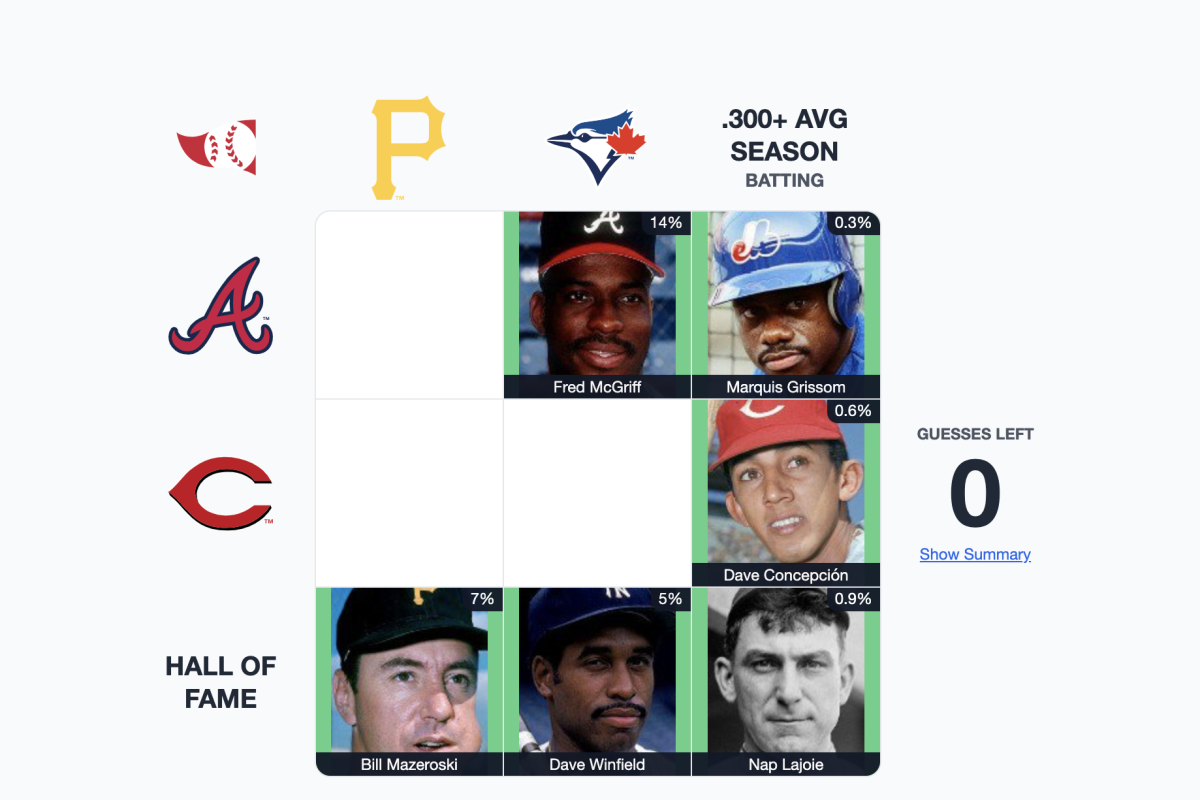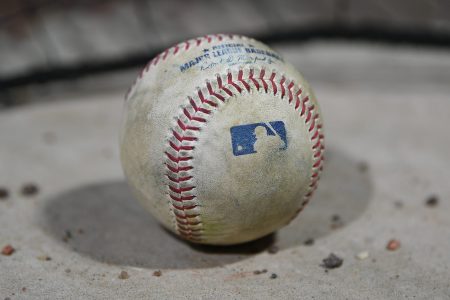Was Roberto Clemente a better right fielder than Hank Aaron? As far as Ed Furillo was concerned, he most certainly was.
In the 1991 comedy film City Slickers, Furillo, the sporting goods salesman played by Bruno Kirby, points out that Clemente ran faster and threw harder than Aaron did. But Daniel Stern’s newly unemployed and soon-to-be-divorced Phil Berquist is having none of it.
“Stop with Roberto Clemente,” an incredulous Berquist tells Furillo, walking toward their fellow ranch hand trainees on a lunch break. “Look, I’m gonna say one thing to you, OK? It’s ‘755 home runs.’ Goodbye.”
A moment later, the attractive, single blonde Helen Slater, who so conveniently for the plot decided to go cattle driving, of all things, while on vacation, groans.
“Baseball…” she says, issuing some side eye. “I used to live with a guy who was like a baseball encyclopedia and I just got flashes.”
That ex stole all her money on his way out of her life, she recounts. But in spite of Slater’s unpleasant association with the sport, she says she still likes it.
“I just never understood how you guys can spend so much time discussing it,” she continues. “I’ve been to games, but I don’t memorize who played third base for Pittsburgh in 1960.”
“Don Hoak,” injects Billy Crystal’s Mitch Robbins, followed half a second later by Furillo’s announcement of the same name, both eagerly answering Slater’s hypothetical query that she never really asked. In the process, they unwittingly prove her point about men’s juvenile obsession with baseball factoids that are generally pretty useless. When Robbins quickly tells Furillo, “Beat ya,” it displays how competitive they can be about them, too.
Leap into real life and fast forward three decades, Cory Enayat, a 31-year-old UPS driver from New Hampshire, is posting to Twitter his Immaculate Grid results from the day. They boast an impressive overall rarity score of 24, and he captions his screenshot with “Beat this.” Before sending the tweet he also proudly fixes the #immaculategrid hashtag to it, optimizing social media exposure.
For the uninitiated, Immaculate Grid is an online game, launched a few months ago, that takes the form of a simple nine-field grid. Logos of Major League Baseball teams and spelled-out achievements line the top and left-side axes, generating cross-sections to be filled in by ballplayers who fit the two criteria implied by the axes’ categories. So if you’re, say, Aléx Gonzalez, a journeyman shortstop who played for seven teams during his 16-year MLB career, your name and image can appear in a tile that falls next to the Atlanta Braves logo and underneath that of the Cincinnati Reds, or some other combination of two squads he was once part of. If there was a field fit for an All Star who played for the Miami Marlins, Gonzalez (and Giancarlo Stanton, José Fernández, Liván Hernández, Jeff Conine and Dan Uggla, off the top of my head) would qualify there as well.
Grid players get nine guesses to fill all nine fields, which change daily. The game was inspired by the “immaculate inning,” a rare real-life feat achieved when a pitcher throws the fewest possible pitches, nine, while striking out all three batters in an inning. Rarity scores are applied to correct submissions in each individual tile, representing the percentage of Grid players who guessed the same player. That data also generates an overall rarity score. The lower the scores, the deeper your knowledge about the league’s history — apparently.
Scrolling through the #immaculategrid hashtag feed on July 11, when Enayat showed off his 24 overall rarity score, I immediately find someone who did in fact “beat” him. It was Brian Lloyd, a 26-year-old content creator who lives in Queens, New York, and happens to be a close friend of mine. His rarity score? 8, just a third of Enayat’s.
I giddily inform Enayat of Lloyd’s triumph by typing his handle in a comment underneath Lloyd’s post. “Here you go,” I tell him. (By the way, this all happened in the middle of a workday for all of us.) Seemingly more gobsmacked than Phil Berquist was in City Slickers over the assertion that Clemente would rank higher than Aaron on a best-right-fielders’ list, Enayat writes, “How is John Lackey .8?!?!” (Daniel Stern’s line delivery sounded like it had, at best, one exclamation point, not multiple interrobangs.)
A former starting pitcher for the Los Angeles Angels (and a few other teams, including, off the top of my head, the Boston Red Sox and Chicago Cubs), Lackey was an “All Star” while with the Angels on at least one occasion. Lloyd plugged Lackey into the field for both criteria and earned a 0.8% rarity score. That was actually higher (or worse) than Enayat’s choice for the same spot — bespectacled reliever Brendan Donnelly, whose rarity score of 0.1% barely registered. Why was Enayat so upset then? He figured way more people would’ve considered Lackey for that slide, and the disparity between Lackey and Donnelly wasn’t large enough to help him outduel Lloyd in the overall rarity score rankings. Elsewhere on the grid, Lloyd played Aléx Gonzalez in the Braves/Reds tile for a 0.2% rarity score. Enayat’s submission there was a much more accomplished and, thus, famous shortstop, Edgar Renteria. His rarity score of 0.8% was 0.6% higher than Gonzalez’s, which didn’t help Enayat’s cause. Other more popular (and, again, worse) choices for that slot were outfielder Josh Hamilton and infielder Mike Moustakas, both of whom had rarity scores around 11%. (Rarity scores may change as the number of people who submit results grows.)
Lloyd tells me he sometimes stays up to midnight to dive into the new Immaculate Grid game immediately after its customary posting. He credits his long history of watching Baseball Tonight on ESPN, listening to sports talk radio and playing baseball video games for his excellence in Immaculate Grid play. (He’s earned several overall rarity scores in the single digits, and usually doesn’t see one far past 50, if it’s that high at all.)
“I have sat around with my friends, with a few drinks, just naming random players,” Lloyd says, a pastime his friend group is hardly alone in enjoying — apparently. “We would just text each other or sit in a room and say, like, ‘Jorge Cantú,’ and that’s it and then just go, ‘Good one.’”
Immaculate Grid, then, he says, is just a fun way to “unearth some of this useless knowledge and kill like 45 minutes of my morning.”
My overall rarity score on July 11 — I think the third day I’d played the Grid — was so relatively poor I didn’t post it publicly. (Twitter user Honest Sports Fan posted a rarity score of 76 that day, captioned his screenshot “I bet no one can beat me today,” and then watched as more than a dozen others commented with better scores, supplying screenshots for proof. That wasn’t going to be me.) I’d also filled in one of the nine fields with a guy whom Lloyd successfully guessed after my brain fed me nothing but blanks for an answer. That means I, admittedly, “cheated.”
Is Major League Baseball Back?
MLB just had its highest-attended weekend in April or May since 2017Everyone online and IRL seems to know that a Grid player cheats when they either take a name from someone else’s results and places them into their own grid or, probably more frequently, first looks up an answer online. One Grid player on July 11, who on Twitter goes by “Scott F,” posted results that rivaled those of Lloyd’s. He included a Milwaukee Braves catcher from the 1950s and ’60s named Del Crandall, along with three other players who are such relative no-names from the past that their photos didn’t automatically embed in the grid like those of most other players. Only one of Scott F’s nine individual-slide rarity scores was over 0.1%, and that one — Troy Percival, who played for the Tampa Bay Rays and the Angels — registered just 4%. Twitter user @L_berchman19 commented underneath Scott F’s post, “holy cheat fest buddy,” to which Scott F wrote back: “Must be hard being a fan for 5 years and unable to accept other people know players from longer ago. Get a grip and go look at what I use Twitter for.” According to his bio, Scott F is a lover of baseball history and “tweet[s] about a lot of historical games.” So, buddy, don’t question his Immaculate Grid-playing integrity, ever.
Though I fell well short of Enayat’s (presumably legitimate) Immaculate Grid results overall on July 11, I made sure to tell him on Twitter that I’d filled in the Baltimore Oriole/All Star slide with Mike Cuellar, a starting pitcher from the 1970s, championship-winning iteration of the team. Cuellar’s rarity score of 0.1% was much better than that of Brian Roberts’ (2%, Enayat’s guess), and even Mark Trumbo’s (3%, Lloyd’s submission). I hung my hat heavily on that the rest of the day, as I did two days later when I logged a 4% rarity score after inserting Mel Ott into a field reserved for San Francisco Giants players who’ve hit 500 home runs. Even though Lloyd finished the entire grid, with another impressive rarity score of 51, and I didn’t complete it at all, I still called him a “dumbass” in a text after he went with Willie McCovey for the Giants’ 500-dinger guy — a much more obvious answer for that slot, proven by the 12% rarity score attached to him.
All this bluster on, for the most part, a single day from just a few people, to say nothing of the 200,000 or so daily Immaculate Grid players (a number that’s probably much larger after the New York Times reported it in a story about the game, also on the July 11), who pound their chests on social media feeds and in text chains after achieving nothing nearly as impressive as actually making the Major Leagues. If you’ll pardon the metaphor, it’s the City Slickers’ debate on steroids.
What does Immacule Grid tap into to cause such a response from its players?
“Our desire for relative advantages is not irrational,” wrote The Atlantic in a 2015 article about a scientific study on human competitiveness. “Such advantages may make us happier” — happier because having advantages over others, throughout most of our species’ existence, has meant greater access to resources and the chance of survival. “It’s said that when chased by a bear, you don’t need to outrun the bear; you just need to outrun your friend,” The Atlantic noted.
Of course, today, unless you’re on the reality series Alone, we’re not running from any bears. Probably anybody playing Immaculate Grid on their smartphones and laptops also, like, has food and water. Nevertheless, human beings’ penchant for competition thrives, and baseball knowledge games like Immaculate Grid stimulate our evolutionary impulse to best one another to the nth degree. Because, as the game’s creator, Brian Minter, a 29-year-old software developer who lives in the Atlanta area, says, in baseball “numbers on their own have their own meaning.”
Think: 60, 61 and, now, 62 all translate to Ruth (1927), Maris (1961) and Judge (2022), those who established and broke the most substantial, modern single-season home run records — at least those that don’t appear to have been tainted by steroid use, though 70 (McGwire, 1998) and 73 (Bonds, 2001) might still be special to some people. Big baseball fans will know to whom and what I’m referring when I simply type out numbers like .406, 56, 755, 511, and so on and so forth. That foundation has fueled competitive baseball banter for generations. While Immaculate Grid only partially deals in MLB player performance numbers, and focuses more primarily on the places in which they laced up their spikes, it’s still a heightened continuation of extremely common, adrenaline-pumping baseball trivia that fans can’t get enough of.
It’s MLB Opening Day. So Why Doesn’t It Feel Like It?
Our writer loves baseball, but he wonders if the new rules are turning America’s pastime into a bummerIs this just a guy thing as City Slickers suggests? Certainly not, and it should come as a surprise to no one that a discussion dealing in gender norms from a 32-year-old mainstream movie hasn’t aged well.
“I’ve seen some women who are definitely better than me” at playing Immaculate Grid, says Minter.
Sports Reference, the company behind arguably the internet gold standard of baseball record keeping, Baseball Reference, purchased the rights to Immaculate Grid from Minter last week (for an undisclosed amount). Sean Forman, President of Sports Reference, agrees that the game has mass, cross-gender appeal. (Makes sense, considering his company’s investment.)
“It’s not quite Cards Against Humanity, but everybody can play and come up with one [grid] that matches the scenario in your own way,” Forman says of the game.
Watch Jeopardy! or go to any Tuesday Trivia Night at your local pub and you’ll find plenty of women fully engaged in similar tests of intellectual mettle. Still, scrolling through the #immaculategrid hashtag, one is hard-pressed to find a woman participating in heated discourse around the game. That may be because, as the Harvard Business Review noted in a 2019 article, “Past research has pointed to evolutionary pressures, the domestic roles that women have traditionally played, and the patriarchal social order” as reasons why women are not as competitive as men. “These accounts suggest that men are more competitive because the payoffs of competition are higher for them,” the piece continues. “Other accounts have linked the gender difference in competitiveness to men’s higher levels of confidence: Women shy away from competition because they’re less likely to think they’ll win.”
That’s unfortunate if only in this case because more shit-talking would probably make Immaculate Grid even more entertaining and addictive than it already is. With all that said, more often than not people on Twitter, Reddit and elsewhere tend to keep things pretty light.
“I have a group of friends, we have a Discord, they’re all SABR members like myself,” says Forman, referencing the Society for American Baseball Research. “If you know anything about SABR, these are people who are really into baseball history, and so [they] post their grids they come up with and invariably there will be comments like, ‘Oh, I completely forgot about that guy!’ ‘Great pull!’ or ‘Where’d you come up with that one?’”
“It’s not so much competitive, I think it really triggers a creative mindset,” Enayat, the guy from Twitter, tells me over the phone. “It’s not so much, ‘Yeah, I wanna get the best score out of my friends.’ I wanna see who my friends thought of and then we discuss it.”
Someone in Enayat’s friend group thought about choosing Nolan Ryan as a Cy Young Award Winner one day on Immaculate Grid, but as another pointed out, the pitching legend was actually never awarded the trophy. (He finished second in the voting three times…confirming this…NO! He finished in the top three on three different occasions. Damn it.) That text chat led to another friend of Enayat’s saying, “Hot take: I think Nolan Ryan was overrated.”
So, in Enayat’s estimation, Immaculate Grid “gives us a different way to talk about baseball and gives us a reason to bring up stats and players from the past.”
“It gives you a chance to remember the players you grew up watching,” says Minter. “It’s interesting to see how different generations play. My dad and father-in-law will be pulling guys from the ’70s and ’80s, and it’s just a great conversation starter.”
That scene in City Slickers doesn’t end with the men storming off, embarrassed over their perceived immaturity, by the way. Instead, Berquist admits that men’s fixation and competitiveness around baseball data points is perhaps “childish.” But, he also tells Slater: “When I was about 18 and my dad and I couldn’t communicate about anything at all, we could still talk about baseball. That was real.”
Not so useless after all.
The Charge will help you move better, think clearer and stay in the game longer. Subscribe to our wellness newsletter today.


























